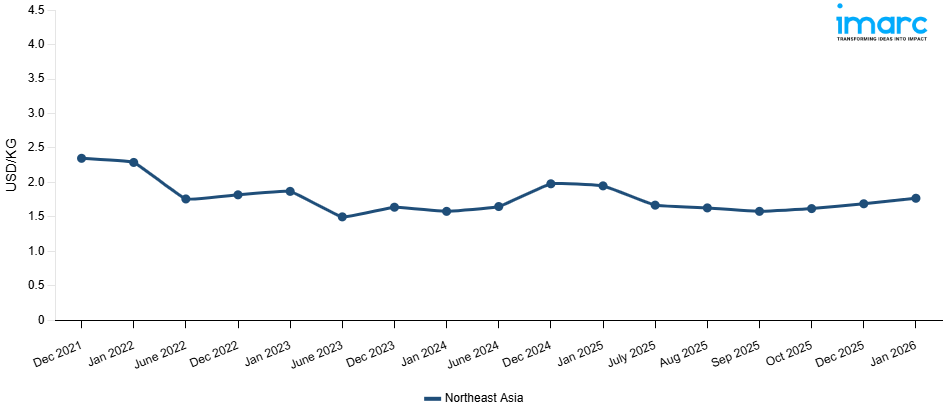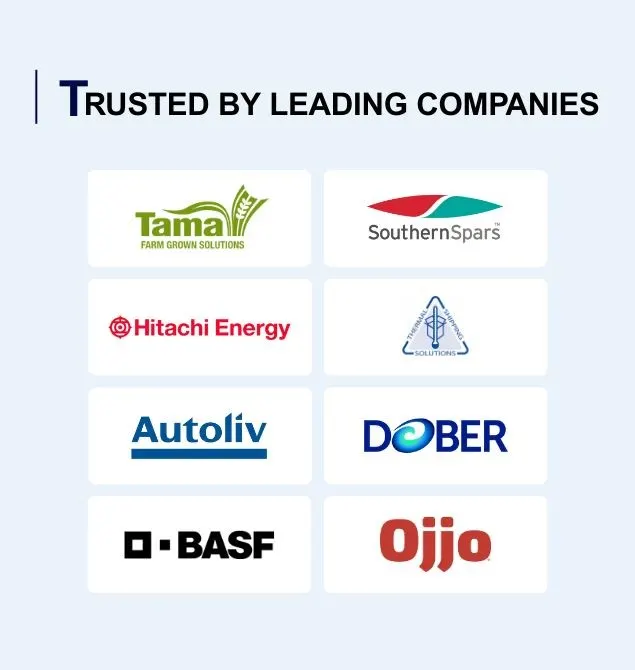
Aluminum Fluoride Prices, Trend, Chart, Demand, Market Analysis, News, Historical and Forecast Data Report 2026 Edition
Aluminum Fluoride Price Trend, Index and Forecast
Track real-time and historical aluminum fluoride prices across global regions. Updated monthly with market insights, drivers, and forecasts.
Aluminum Fluoride Prices January 2026
| Region | Price (USD/KG) | Latest Movement |
|---|---|---|
| Northeast Asia | 1.77 | 4.7% ↑ Up |
Aluminum Fluoride Price Index (USD/KG):
The chart below highlights monthly aluminum fluoride prices across different regions.

Get Access to Monthly/Quarterly/Yearly Prices, Request Sample
Market Overview Q3 Ending September 2025
Northeast Asia: In Northeast Asia, aluminum fluoride prices declined as weak demand from the aluminum smelting sector weighed heavily on procurement activity. The aluminum fluoride price index reflected bearish sentiment, with adequate supply levels supported by steady fluorspar and hydrofluoric acid feedstock availability. Sluggish industrial consumption in the primary aluminum industry, combined with cautious downstream buying, reinforced the downward pressure. Export opportunities also remained subdued, as competitive global supply limited regional producers’ ability to command higher prices in this quarter.
Aluminum Fluoride Price Trend, Market Analysis, and News
IMARC's latest publication, “Aluminum Fluoride Prices, Trend, Chart, Demand, Market Analysis, News, Historical and Forecast Data Report 2026 Edition,” presents a detailed examination of the aluminum fluoride market, providing insights into both global and regional trends that are shaping prices. This report delves into the spot price of aluminum fluoride at major ports and analyzes the composition of prices, including FOB and CIF terms. It also presents detailed aluminum fluoride prices trend analysis by region, covering North America, Europe, Asia Pacific, Latin America, and Middle East and Africa. The factors affecting aluminum fluoride pricing, such as the dynamics of supply and demand, geopolitical influences, and sector-specific developments, are thoroughly explored. This comprehensive report helps stakeholders stay informed with the latest market news, regulatory updates, and technological progress, facilitating informed strategic decision-making and forecasting.
Aluminum Fluoride Industry Analysis
The global aluminum fluoride industry size reached USD 2.41 Billion in 2025. By 2034, IMARC Group expects the market to reach USD 4.00 Billion, at a projected CAGR of 5.51% during 2026-2034. Growth is primarily driven by the rising demand from the aluminum industry for smelting operations, increasing applications in ceramics and glass, and consistent consumption in chemical synthesis processes that support industrial growth worldwide.
Latest developments in the aluminum fluoride industry:
- January 2025: ALCORE entered into a lease agreement with Rio Tinto Aluminium to establish a pilot plant in Bell Bay, Australia, which will produce aluminum fluoride from hydrogen fluoride. This milestone marked the first stage of its plan to supply critical raw materials to domestic aluminum smelters while enhancing recycling of industrial byproducts.
- July 2023: Norsk Hydro ASA successfully acquired Alumetal S.A., a Poland-based aluminum producer using recycled content. This acquisition strengthened Hydro’s role in the aluminum fluoride market by expanding production capacity and securing sustainable supply chains across Europe.
- June 2023: Novelis Inc., a leading provider of sustainable aluminum solutions, signed a significant contract with Coca-Cola Bottlers’ Sales & Services Company. The collaboration increased demand for aluminum fluoride in commercial construction and metallurgical industries, supporting both companies’ long-term growth strategies.
Product Description
Aluminum fluoride (AlF₃) is a white crystalline inorganic compound primarily produced through the reaction of alumina with hydrofluoric acid or fluorspar with sulfuric acid. It plays a critical role in the aluminum industry as a flux, reducing the melting point of alumina and improving the efficiency of the electrolytic smelting process. Aluminum fluoride is also used in the production of fluorinated glass, ceramics, and specialty chemicals. Its high thermal stability and ionic conductivity make it essential for industrial processes that demand energy efficiency and chemical resilience. With primary demand coming from the aluminum sector, it is regarded as a strategically significant chemical in global industrial supply chains.
Report Coverage
| Key Attributes | Details |
|---|---|
| Product Name | Aluminum Fluoride |
| Report Features | Exploration of Historical Trends and Market Outlook, Industry Demand, Industry Supply, Gap Analysis, Challenges, Aluminum Fluoride Price Analysis, and Segment-Wise Assessment. |
| Currency/Units | US$ (Data can also be provided in local currency) or Metric Tons |
| Region/Countries Covered | The current coverage includes analysis at the global and regional levels only. Based on your requirements, we can also customize the report and provide specific information for the following countries: Asia Pacific: China, India, Indonesia, Pakistan, Bangladesh, Japan, Philippines, Vietnam, Thailand, South Korea, Malaysia, Nepal, Taiwan, Sri Lanka, Hongkong, Singapore, Australia, and New Zealand* Europe: Germany, France, United Kingdom, Italy, Spain, Russia, Turkey, Netherlands, Poland, Sweden, Belgium, Austria, Ireland, Switzerland, Norway, Denmark, Romania, Finland, Czech Republic, Portugal and Greece* North America: United States and Canada Latin America: Brazil, Mexico, Argentina, Columbia, Chile, Ecuador, and Peru* Middle East & Africa: Saudi Arabia, UAE, Israel, Iran, South Africa, Nigeria, Oman, Kuwait, Qatar, Iraq, Egypt, Algeria, and Morocco* *The list of countries presented is not exhaustive. Information on additional countries can be provided if required by the client. |
| Information Covered for Key Suppliers |
|
| Customization Scope | The report can be customized as per the requirements of the customer |
| Report Price and Purchase Option |
Plan A: Monthly Updates - Annual Subscription
Plan B: Quarterly Updates - Annual Subscription
Plan C: Biannually Updates - Annual Subscription
|
| Post-Sale Analyst Support | 360-degree analyst support after report delivery |
| Delivery Format | PDF and Excel through email (We can also provide the editable version of the report in PPT/Word format on special request) |
Key Benefits for Stakeholders:
- IMARC’s report presents a detailed analysis of aluminum fluoride pricing, covering global and regional trends, spot prices at key ports, and a breakdown of Ex Works, FOB, and CIF prices.
- The study examines factors affecting aluminum fluoride price trend, including raw material costs, supply-demand shifts, geopolitical impacts, and industry developments, offering insights for informed decision-making.
- The competitive landscape review equips stakeholders with crucial insights into the latest market news, regulatory changes, and technological advancements, ensuring a well-rounded, strategic overview for forecasting and planning.
- IMARC offers various subscription options, including monthly, quarterly, and biannual updates, allowing clients to stay informed with the latest market trends, ongoing developments, and comprehensive market insights. The aluminum fluoride price charts ensure our clients remain at the forefront of the industry.
Key Questions Answered in This Report
The aluminum fluoride price in January 2026 was 1.77 USD/Kg in Northeast Asia.
The aluminum fluoride pricing data is updated on a monthly basis.
We provide the pricing data primarily in the form of an Excel sheet and a PDF.
Yes, our report includes a forecast for aluminum fluoride prices.
The regions covered include North America, Europe, Asia Pacific, Middle East, and Latin America. Countries can be customized based on the request (additional charges may be applicable).
Yes, we provide both FOB and CIF prices in our report.
Need more help?
- Speak to our experienced analysts for insights on the current market scenarios.
- Include additional segments and countries to customize the report as per your requirement.
- Gain an unparalleled competitive advantage in your domain by understanding how to utilize the report and positively impacting your operations and revenue.
- For further assistance, please connect with our analysts.
Why Choose Us
IMARC offers trustworthy, data-centric insights into commodity pricing and evolving market trends, enabling businesses to make well-informed decisions in areas such as procurement, strategic planning, and investments. With in-depth knowledge spanning more than 1000 commodities and a vast global presence in over 150 countries, we provide tailored, actionable intelligence designed to meet the specific needs of diverse industries and markets.
1000
+Commodities
150
+Countries Covered
3000
+Clients
20
+Industry
Robust Methodologies & Extensive Resources
IMARC delivers precise commodity pricing insights using proven methodologies and a wealth of data to support strategic decision-making.
Subscription-Based Databases
Our extensive databases provide detailed commodity pricing, import-export trade statistics, and shipment-level tracking for comprehensive market analysis.
Primary Research-Driven Insights
Through direct supplier surveys and expert interviews, we gather real-time market data to enhance pricing accuracy and trend forecasting.
Extensive Secondary Research
We analyze industry reports, trade publications, and market studies to offer tailored intelligence and actionable commodity market insights.
Trusted by 3000+ industry leaders worldwide to drive data-backed decisions. From global manufacturers to government agencies, our clients rely on us for accurate pricing, deep market intelligence, and forward-looking insights.
 Request Customization
Request Customization
 Inquire Before Buying
Inquire Before Buying
 Speak to an Analyst
Speak to an Analyst Request Brochure
Request Brochure




.webp)




.webp)












